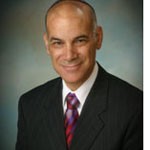By Rabbi Leonard Rosenthal

SAN DIEGO–Americans of all political persuasions are shocked and outraged by the attack on Congresswoman Gabrielle Giffords and those who joined her for a community meeting at a supermarket in Tucson, Arizona. Six innocent people were killed and thirteen wounded in an attack by a mentally disturbed individual at one of the Congresswoman’s “Congress on Your Corner” events.
Once again Americans are asking the question: “Just how accessible should our elected officials be?” If Congresswoman Giffords had kept herself more insulated from the public, perhaps she would not have been attacked.
Before God gave Moses the Ten Commandments on Mt. Sinai, God instructed him to keep the Israelites at a distance: “The Lord said to Moses, ‘Go down, warn the people not to break through to the Lord to gaze, lest many of them perish.'” (Ex. 19:21) Boundaries were established around the mountain to keep the Israelites from coming to close. God wanted to keep the people at a distance. God would communicate “face to face” only with Moses, who served as an intermediary bringing God’s Word to the people and the people’s concerns to God.
God wants us to know that God is totally other, distant, distinct, and separate from all creation. We are not to come near God or “gaze” upon God lest we be overwhelmed and consumed.
Moses, however, as the flesh and blood leader of the Israelites, was a man of the people. He was open and accessible to one and all, so much so that every Israelite felt entitled to bring him their problems: “…Moses sat as a magistrate among the people, while the people stood about Moses from morning until evening.” (Ex. 18:13) He barely allowed himself a minute’s rest. He wanted everyone to know he was there for them.
This so exhausted him, however, that he eventually followed his father-in-law, Yitro’s, suggestion to establish a court system to ease his load: “Moses chose capable men out of all Israel, and appointed them heads over the people…and they judged the people at all times: the difficult matters they would bring to Moses, and the minor matters they would decide themselves.” (Ex. 19:25-26)
Nevertheless, Moses continued to be an extremely public persona. He remained a model of accessibility and responsiveness to the plight of his people.
Our elected representatives should not act like God. They should be more like Moses. We elect them and they are responsible to us. They are supposed to know what we, their constituents, want and vote and legislate on our behalf. Unless they are accessible to us, they will not know how we feel about the many weighty issues before them. The more layers that are placed between them and us, the less able they will be to do their jobs.
We want our elected officials to meet us in the small groups favored by Congresswoman Giffords. We want them to hear our voices and consider our opinions as they serve. This admittedly will sometimes put them as risk. We therefore owe it to them to provide the security and protection necessary to avoid future attacks, be they planned by terrorists or by one of their deranged constituents.
We have been praying for Congresswoman Giffords’ refuah shleimah, complete and speedy healing during every minyan and Shabbat service. I ask you will keep her and the other victims in your prayers, as well.
*
Rabbi Rosenthal is spiritual leader of Tifereth Israel Synagogue in San Diego